William Bingham (1743 - 1819) was Archdeacon of London [1] from 1789 [2] to 1813.
William Bingham (1743 - 1819) was Archdeacon of London [1] from 1789 [2] to 1813.
Bingham was born in Melcombe Bingham and educated at Brasenose College, Oxford. [3] He was Vicar of Great Gaddesden until 1777; and Rector of Hemel Hempstead from 1778. In 1792 he was appointed an Honorary Chaplain to the King.
Bingham married Agnata Dörrien in 1775: [4] they had four children, one of whom, Arthur, was a distinguished officer in the Royal Navy. [5]

Edward Gibbon was an English historian, writer and Member of Parliament. His most important work, The History of the Decline and Fall of the Roman Empire, was published in six volumes between 1776 and 1788 and is known for the quality and irony of its prose, its use of primary sources, and its polemical criticism of organised religion.
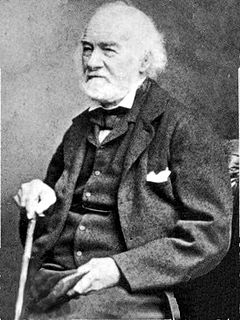
John Payne Collier was an English Shakespearean critic and forger.
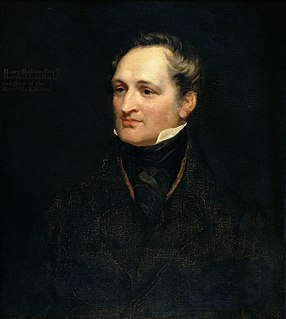
Henry Hallam was an English historian. Educated at Eton and Christ Church, Oxford, he practised as a barrister on the Oxford circuit for some years before turning to history. His major works were View of the State of Europe during the Middle Ages (1818), The Constitutional History of England (1827), and Introduction to the Literature of Europe, in the Fifteenth, Sixteenth and Seventeenth Centuries (1837). Although he took no part in politics himself, he was well acquainted with the band of authors and politicians who led the Whig party. In an 1828 review of Constitutional History, Robert Southey claimed that the work was biased in favour of the Whigs.
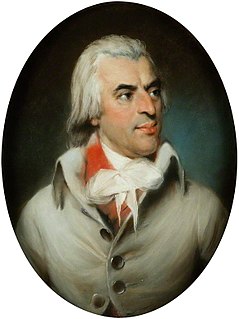
Arthur Young was an English writer on agriculture, economics and social statistics. Not himself successful as a farmer, he built on connections and activities as a publicist a substantial reputation as an expert on agricultural improvement. After the French Revolution of 1789, his views on its politics carried weight as an informed observer, and he became an important opponent of British reformers. Young is considered a major English writer on agriculture, although he is best known as a social and political observer. Also read widely were his Tour in Ireland (1780) and Travels in France (1792).

Thomas William Rhys Davids was an English scholar of the Pāli language and founder of the Pāli Text Society. He took an active part in founding the British Academy and London School for Oriental Studies.

George John Spencer, 2nd Earl Spencer,, styled Viscount Althorp from 1765 to 1783, was a British Whig politician. He served as Home Secretary from 1806 to 1807 in the Ministry of All the Talents.
Thomas Rymer was an English poet, critic, antiquary and historian. His most lasting contribution was to compile and publish 16 volumes of the first edition of Foedera, a work in 20 volumes containing agreements made between The Crown of England and foreign powers since 1101. He held the office of English Historiographer Royal from 1692 to 1714. He is credited with coining the phrase "poetic justice" in his book The Tragedies of the Last Age Consider'd (1678).
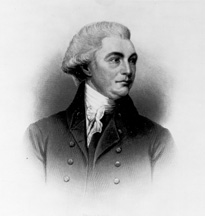
William Bingham was an American statesman from Philadelphia. He was a delegate for Pennsylvania to the Continental Congress from 1786 to 1788 and served in the United States Senate from 1795 to 1801.

Edward Caird was a Scottish philosopher. He was a holder of LLD, DCL, and DLitt.

William Morgan, FRS was a British physician, physicist and statistician, who is considered the father of modern actuarial science. He is also credited with being the first to record the "invisible light" produced when a current is passed through a partly evacuated glass tube: "the first x-ray tube".
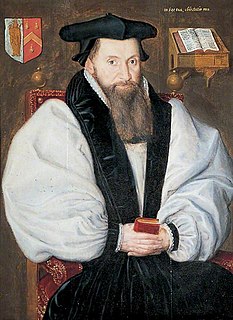
Robert Abbot (1560–1617) was an Anglican clergyman and academic, known as a polemical writer. He served as Master of Balliol College, Oxford, Regius Professor of Divinity, and Bishop of Salisbury from 1615. Among his four younger brothers, George became Archbishop of Canterbury and Maurice became Lord Mayor of London.

Sir James Balfour Paul was the Lord Lyon King of Arms, the officer responsible for heraldry in Scotland, from 1890 until the end of 1926.

Arthur Bingham Walkley, usually known as A B Walkley was an English public servant and drama critic. As a civil servant he worked for the General Post Office from 1877 to 1919, in increasingly senior posts; he did not seek the highest official positions, preferring to leave himself time and energy for his parallel career as a drama critic. As a journalist he worked with Bernard Shaw on The Star at the beginning of his newspaper career; he is probably best known for his twenty-six years as theatre critic of The Times. He retired from the Post Office in 1919, and for the last six years of his life concentrated wholly on writing.

William John Broderip FRS was an English lawyer and naturalist.
The High Sheriff of County Galway was the Sovereign's judicial representative in County Galway. Initially an office for lifetime, assigned by the Sovereign, the High Sheriff became annually appointed from the Provisions of Oxford in 1258. Besides his judicial importance, he had ceremonial and administrative functions and executed High Court Writs.
Arthur Batt Bingham (1784–1830) was an officer in the Royal Navy, rising to the rank of post captain. He is remembered chiefly for his command of HMS Little Belt, when the Little Belt affair occurred, just prior to the War of 1812.

Vincent Arthur Smith, CIE, was an Irish Indologist and art historian.
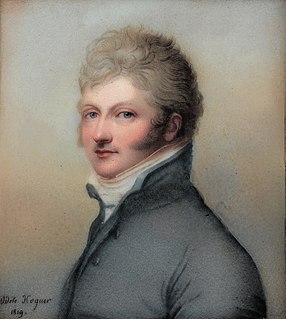
Richard Bingham, 2nd Earl of Lucan, styled The Honourable from 1776 to 1795 and subsequently Lord Bingham until 1799, was an Irish peer and Tory politician.
The Diary of John Evelyn, a gentlemanly Royalist and virtuoso of the seventeenth century, was first published in 1818 under the title Memoirs Illustrative of the Life and Writings of John Evelyn, in an edition by William Bray. Bray was assisted by William Upcott, who had access to the Evelyn family archives. The diary of Evelyn's contemporary Samuel Pepys was first published in 1825, and became more celebrated; but the publication of Evelyn's work in part prompted the attention given to Pepys's.
Percy Stafford Allen, FBA was a British classical scholar, best known for his writings on Desiderius Erasmus.
| Church of England titles | ||
|---|---|---|
| Preceded by Richard Beadon | Archdeacon of London 1789–1813 | Succeeded by Joseph Pott |